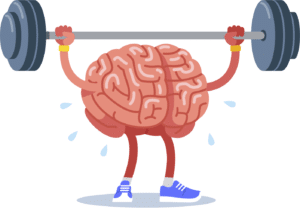[ad_1]
It wasn’t all that long ago that scientists believed that our brains stopped growing and changing in our mid-20s. Then, new technologies were born. EEGs, PET scans, and fMRIs gave us the ability to observe the inner workings of living, functioning human brains, and everything changed!

These amazing machines created a window into a brain that is constantly molding and re-molding itself from birth to death. When we learn something new or train in a new skill, our brains get bigger in areas that relate to that new knowledge. When we quit using certain areas of the brain, they shrink. We now know that our brains respond to mental exercise the same way our muscles respond to physical exercise.
What happens in our brains when we practice mindfulness meditation?
With this new knowledge about the brain and so much evidence about the benefits of mindfulness meditation, neuroscientists wanted to know what was happening in the brain when we practice mindfulness. Here is what they found.
In studies at Harvard, scientists found that mindfulness actually makes the prefrontal cortex grow. The prefrontal cortex is our very own CEO; it’s the area of the brain that is responsible for planning, decision-making, and emotion regulation, as well as for coordinating activities between many other areas of the brain.
Further studies revealed that mindfulness shrinks the amygdala, the alarm center of the brain. When something happens, it is the amygdala that sends out the fight and flight signals to the rest of our body, often a precursor to stress and anxiety. This process overrides our prefrontal cortex, impeding our ability to make rational decisions—we become solely focused on survival. When the amygdala is regulated, we can more easily access our thinking and planning brain (prefrontal cortex) in a crisis, and we also don’t react as strongly to that crisis in the first place.
Mindfulness also enlarges the hippocampus, an area of the brain that plays a very important role in storing and strengthening our memories. It also acts as our internal GPS, helping us with spatial awareness and navigating in the world.
Additionally, brain studies have shown that the left prefrontal cortex is more active when we’re experiencing positive emotions, and the right prefrontal cortex is more active when we’re experiencing negative emotions. Functionally, scientists found that over time, mindfulness practice actually strengthens the activity of the left prefrontal cortex and shrinks or reduces the activity of the right prefrontal cortex. In other words, we can change our outlook and experience by repeatedly identifying what triggers positive emotion states and what triggers negative emotion states. With self-awareness, we can completely change our lives.
What does all this mean to us?
The wonderful news is that we can intentionally shape our brains in many beneficial ways and in a relatively short period of time. Research has shown that focus and attention improve in only three hours of cumulative meditation, and in just eleven hours, neuroscientists can actually see the physical changes in the brain.
That means that if you start today and invest only 10 minutes a day in dedicated practice, scientists could look inside your brain and see the physical changes in just nine weeks.
Learn more about the brain science and the effects of mindfulness in this brief video:
Powerful benefits are produced when we regularly harness our attention in this way.
Over thirty-five years of peer reviewed research has shown that mindfulness is an effective complement to medical treatments in such diverse conditions as:
- Chronic Pain
- Diabetes
- Cardiovascular Disease
- Autoimmune Diseases
- Psoriasis
- Fibromyalgia
- and many others
In the mental health realm, mindfulness has been shown to:
- Decrease stress
- Decrease depression
- Decrease anxiety
- Help with the symptoms of ADHD
- Be an effective treatment for substance abuse
There is also a growing body of evidence that mindfulness increases happiness, well-being, focus, attention, creativity, and academic achievement.
The question is not whether your brain is changing. The question is whether you want to be a victim of your circumstances or the author of your experience?
[ad_2]
www.grandrapidscenterformindfulness.com







